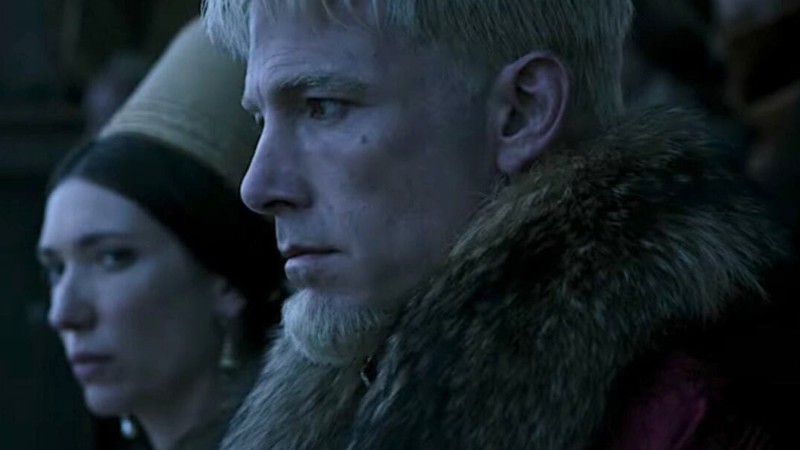Ridley Scott returns to the historical epic, a genre he previously explored with films like Gladiator (2000) and Kingdom Of Heaven (2005). It isn’t as good as the former but it is a welcome departure from Scott’s irritating insistence on reviving the Alien franchise. Set in 14th century France, it opens right before the titular clash between Jean de Carrouges (Matt Damon) and Jacques Le Gris (Adam Driver) as Marguerite (Jodie Comer), Jean’s wife, anxiously awaits. The rest of the story is a three-part examination of how we got here, told through the perspectives of Jean, Jacques and Marguerite. It’s a refreshingly measured affair that trades the bombast of Gladiator with a more contemplative meditation on gender dynamics.
The most interesting aspect of The Last Duel is its three-part structure inspired by Rashomon (Akira Kurosawa, 1950). Each main player is viewed through different lenses, which brings more balanced characterisation than is typically found in single-protagonist narratives. Le Gris is more than just a pure villain, Carrouges is less heroic than he initially seems, and Marguerite is given necessary attention despite being somewhat at the mercy of her surroundings. Given the issue at hand is sexual assault this structure affords useful insight into the differences between male and female perceptions of rape. The script is written by Damon and Affleck, who chose Nicole Holofcener to write Marguerite’s side of the story, a choice which effectively translates on-screen. Part of the intrigue is seeing how each new viewpoint builds or disproves the previous one and where the truth starts and ends. The film avoids black and white characterisation, instead offering the evidence as perceived by each character – this gives it a necessary sense of honesty. It is a shame that this structural conceit wasn’t marketed more – perhaps the film would have performed better if it had been.
This triptych angle also gives the climactic duel the weight it needs. We are invested in each of the characters and feel concerned for the possible consequences. It doesn’t hurt that Scott has lost none of his knack for staging a breathtaking action sequence. Every blow, fall and near-miss is viscerally felt – it’s a brutal fight that stands out as one of the best in its genre.
The rest of the film looks great. Even in his lesser work Scott has maintained the ability to create immersive, beautifully detailed sets, and The Last Duel is no different. Instead of being generically fancy the candle-lit rooms and intricate costumes give the environment a crucially lived-in quality absent in most period pieces. The only issue the film has in this regard is that the colours are muted, which will render it dull to some. Thankfully, Ben Affleck’s Pierre shows up every now and then in flamboyant, gold-covered dress to bring life to the visuals.

Frustratingly, this historical detail does not extend to the accents and dialogue. Every English-language period piece set abroad has to get over the hurdle of how to depict other cultures – this was a problem with Chernobyl (Craig Mazin, 2019) and The Death Of Stalin (Armando Iannucci, 2017), and it’s a problem here. Matt Damon, Ben Affleck and Adam Driver are odd choices to play French nobles, so there’s a constant suspension-of-disbelief there. Perhaps because of this, the cast adopt generally English accents, although French singing appears every now and then. This would be fine if such accents were consistent, but they are not – Affleck and Damon struggle to conceal their Americanness which leads to an unwanted, underlying sense of parody that threatens to derail the seriousness of the drama. As well as this, the language itself suffers from inconsistency as the dialogue fleets between Shakespearian and contemporary speak. Perhaps this wouldn’t be as annoying if the film wasn’t so visually precise, but it is, so it is.
Ultimately The Last Duel suffers most from a lack of mystery. Even though the smaller details are revealing, the wider issue of who is at fault and who isn’t is obviously apparent very early on. At one point the on-screen text even states that Marguerite’s version is “The truth” – a film that revisits the same event three times needs more intrigue than this. Rashomon works because each perspective is different enough that the search for truth feels worthwhile. The absence of such distinctions doesn’t stop the final duel from being intense but it does add to The Last Duel’s forgettable quality.
Scott’s drama is a discursive, meditative affair which is unlikely to completely blow anyone away. Its failure is sad in the sense that it proves the notion that non-franchise, mid-budget films are dying a slow death, but it does also seem like its audience is limited to history buffs and cinephiles hoping for a Ridley Scott rennaissance.
In the end, The Last Duel is a generally decent film that benefits from narrative nuance and some brilliant direction from Scott – but it is inessential.
The Last Duel is in cinemas on Friday, October 15th. On most VoD platforms in June.








